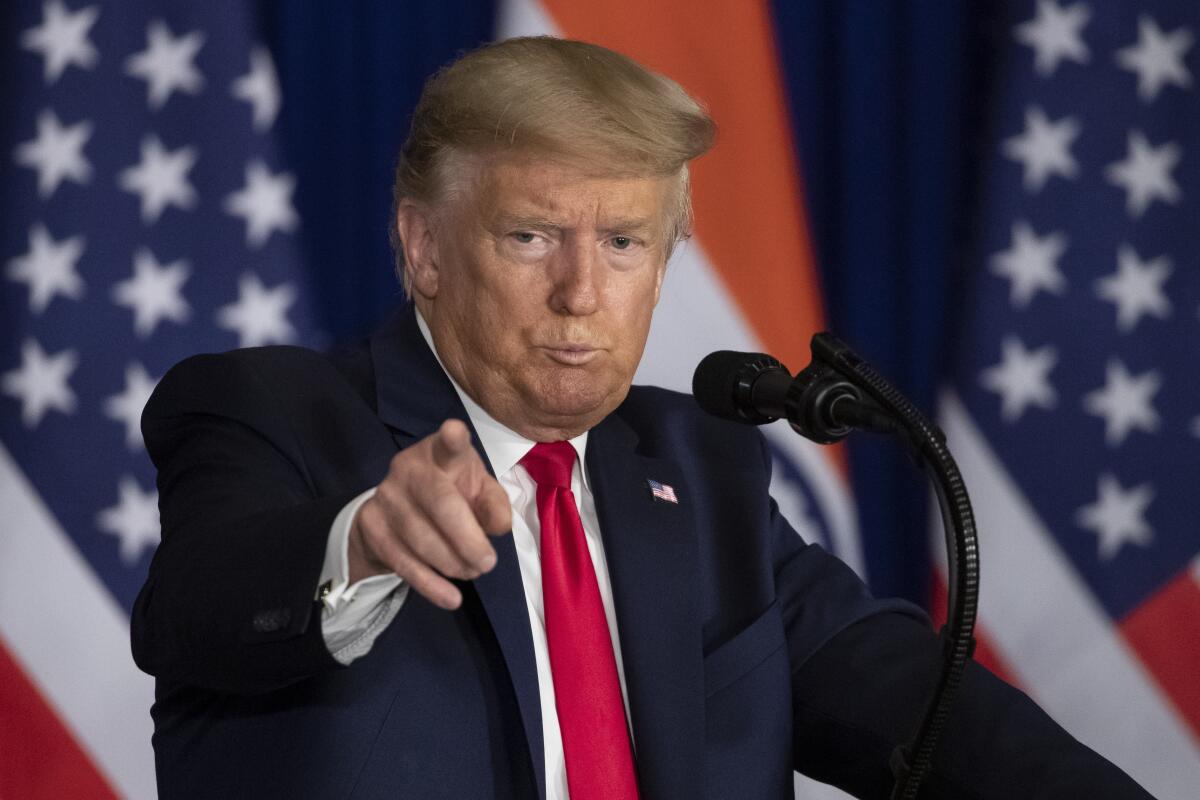Trump declines to condemn India’s anti-Muslim law

- Share via
NEW DELHI — Wrapping up a two-day trip to India, President Trump declined Tuesday to condemn India’s controversial new citizenship law, which discriminates against Muslims, and downplayed the threat from the coronavirus, which now has spread to 34 countries, claiming it’s “very well under control in our country.”
At a news conference in New Delhi, the normally opinionated president appeared visibly uncomfortable and tentative at times as he tried to deflect thorny questions about India’s religious violence and the guilty verdict for former Hollywood mogul Harvey Weinstein on rape charges.
When asked about the verdict and whether justice was served, Trump, who has faced numerous sexual misconduct allegations, instead discussed Weinstein in personal and political terms, claiming that Michelle Obama “loved him” and that Weinstein wanted Hillary Clinton to win in 2016.
“I was never a fan of Harvey Weinstein,” Trump said. “He said he was going to work hard to defeat me in the election. How did that work out?”
Asked by a reporter to deliver a message to “women in America who are still afraid to come forward and share their stories of sexual harassment and assault,” Trump, an avid watcher of TV news, claimed he had not paid close attention to the trial while he was in India. Weinstein was convicted of rape and a felony sex crime Monday in New York.
“I don’t know the actual results,” Trump said. “From the standpoint of women, I think it was a great thing and it sends a very strong message.”
Trump was also asked numerous times about the swift spread of the coronavirus, which has panicked the world and roiled financial markets. Medical authorities have confirmed more than 80,000 cases around the world, and more than 2,700 deaths.
Trump tried to downplay the threat, claiming it’s “very well under control in our country” and that people infected in the United States “are getting better. They’re all getting better.”
His comments appeared at odds with a warning Tuesday by the Centers for Disease Control and Prevention that Americans should brace for the likelihood that the coronavirus will hit the United States and could cause major disruptions in travel, schools and commerce.
“We are asking the American public to work with us to prepare for the expectation that this is going to be bad,” Dr. Nancy Messonnier, director of the CDC’s National Center for Immunization and Respiratory Diseases, told reporters on a conference call.
“It’s not so much of a question of if this will happen in this country any more but a question of when this will happen,” she said.
The CDC has confirmed 53 coronavirus patients in the United States. There is no known cure or vaccine.
Saying he didn’t want to say anything to overshadow his “fantastic” trip to India, Trump declined to criticize Prime Minister Narendra Modi’s new citizenship law, which excludes Muslims and has helped fuel a new wave of communal violence.
Ten people have been reported killed, and dozens injured, in Muslim-majority neighborhoods north of the capital since Sunday. The clashes between protesters in favor of the law and those against it quickly took on religious overtones, with Hindu and Muslim mobs fighting each other.
The law passed by India’s parliament last year prioritizes citizenship for Hindus, Sikhs, Buddhists, Jains, Parsis and Christians while excluding Muslims.
Trump, asked several times about Modi’s support for the new law, praised the Indian leader.
“He wants people to have religious freedom,” Trump insisted. “They have really worked hard on religious freedom.”
Trump appeared to back Modi’s concern that the majority-Hindu country is being overrun by Muslims.
“He told me, I guess they have 200 plus, 200 million Muslims in India, and a fairly short while ago, they had 14 million,” Trump said.
India had about 35 million Muslims in 1951, according to the first census after independence, or about 9.8% of the population. The 201 million Muslims today are 14.2% of the population.
Later, Trump was asked again about the citizenship law. “I don’t want to discuss that, and hopefully they’re going to make the right decision for the people,” he said.
The question was awkward for Trump, who has drawn criticism for his own anti-immigrant policies, including his travel ban.
During the 2016 campaign, Trump suggested barring all Muslims from entering the country. After he took office, he issued an executive order banning visitors from seven predominantly Muslim countries, but that was overturned by federal courts. A later version was upheld and was expanded this month to impose varying visa restrictions on nationals from 13 countries, including several that are not Muslim-majority.
Trump defended the restrictions again Tuesday while insisting they are not intended to single out Muslims.
The 45-minute news conference, at the ITC Maruya Hotel, followed a day of meetings and statements intended to show the close relationship between Washington and New Delhi. Trump then attended a state banquet before boarding Air Force One for his flight home.
Though the sides failed to reach a comprehensive trade deal, Trump claimed victory on smaller agreements to increase trade and expand cooperation in other areas, including efforts to control opioid abuse.
For Trump, a massive public rally Monday at a new cricket stadium in Ahmedabad — complete with elaborate dancing, Bollywood stars and deafening applause — clearly was the highlight of his visit.
“When I look at 125,000 seats and that was an incredible scene,” he said Tuesday. “It was an incredible thing. Nobody’s ever seen anything like it.”
Stokols reported from New Delhi and Bierman from Washington.
More to Read
Get the L.A. Times Politics newsletter
Deeply reported insights into legislation, politics and policy from Sacramento, Washington and beyond. In your inbox three times per week.
You may occasionally receive promotional content from the Los Angeles Times.












